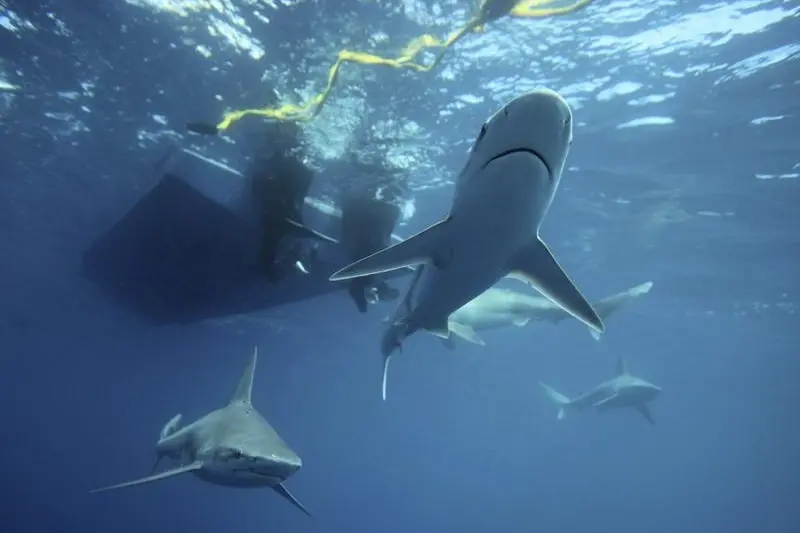PHOTO
Saturday, Jun 04, 2016
Muscat: Salim Al Muqaimi is one of the few Omani fisherman willing to risk his life to hunt sharks.
The 35-year-old has been given the nickname ‘Shark King’ by residents of Sidab village where he comes from a long line of shark hunters.
The dangerous profession requires a very particular skill set, knowledge of sharks and a whole lot of courage.
The ‘Shark King’ sat down with Gulf News and gave a rundown on how to catch a shark.
First, you have to know the best place to find them. The best bet is either in rough seas or to find smelly areas where the remains of fish eaten by sharks surface.
Once he has found a good spot to go hunting, he uses the heads of tuna as bait, attaching several pieces to a sturdy rope strong enough to support the weight of the shark which ranges anywhere from 200kg to 750kg.The rope will extend up to three kilometres and the bait is spaced out a perfect 28 metres from one another. This is so sharks don’t gather at one bait and are more spread out, which increases the likelihood of catching multiple sharks.
At least four other fishermen are needed in the boat to help lift the shark once it is caught.
Then, the ‘Shark King’ waits.
“When the boats starts shaking we all jump up and the adrenalin starts to pump in our nervous excitement,” he said.
Sometimes the sharks are at least 50 metres deep, so the physical act of pulling it up is a long and tiring process which could take up to three hours in some cases.
“It is a battle of wills. Man vs. Shark,” he said with a proud smile.
If the shark loses the battle and is pulled out of the water, the hardest part, according to Al Muqaimi, is killing it before it is brought into the boat.
He does this by hitting the shark in the head repeatedly with a sharp iron hook called Al Mantab.
The Shark King makes up to 1,500 Omani rials (Dh14,309) a month by selling the sharks used mostly for their valuable fins considered a delicacy in Asian cuisine. He needs to sell around 15 sharks to make that amount. Specialised traders buy and sell them mostly to the UAE but also some Asian countries.
The biggest shark Al Muqaimi ever caught weighed a whopping 750kg and took three hours to pull out of the water.
He sold it for a 700 rials.
But sharks are not for everyone. Despite the high earnings, many fisherman believe the profession to be too dangerous.
“Sharks are smart creatures and sometimes they pretend they are dead when they come out of the water. Then they strike,” Ahmad Al Hasni, a fisherman from the village of Haramil, told Gulf News.
He catches small to medium fish, but can still rake in over 1,000 rials a month.
“I have bought a house, car and boat and I got married,” the 28-year-old said. “The extra 500 rials is just not worth it for me to risk my life,” he said.
The ‘Shark King’ recalls losing many friends, fellow fisherman, who went hunting for sharks.
“It’s very sad as they just wanted to put food on the table for their families,” Al Muqaimi said.
But losing people has not pushed Al Muqaimi and others away from the profession.
Five years ago, Mahmoud Al Mashari went fishing with his father for sharks. The shark managed to overpower them on the boat, killing his father and ripping off his left arm.
But Al Mashari still accompanies his friends on fishing expeditions.
“There has been a lot of development in the past five years of marine mapping and communication devices that has made it easier to locate and rescue fishermen in emergencies,” Al Muqaimi said.
While the fins are the most valuable, the rest of the shark is also used quite commonly in Oman.
Shark meat is used in some traditional dishes, while the oil of the liver is used to waterproof wooden dhows.
Oman’s many shark species include the Great Hammerhead, the Bull Shark, Blacktip Shark, Milk Shark and Big-Eyed Houndshark, Bramble Shark and Spot Tail Shark.
Under threat
The increasing demand of shark fins has sharply reduced Oman’s shark population, according to an official at the Ministry of Agriculture and Fisheries.
“The Omani government needs to intervene to reduce the number of sharks being killed,” Nasser Al Hashemi, an Omani environment activist, told Gulf News.
“The Sharks could soon face extinction,” he warned.
Government investigations have confirmed that some species of sharks are already facing extinction.
The Ministry of Environment and Climate Affairs conducted an intensive research five years ago gathering details about Oman’s shark population.
An official at the ministry told Gulf News that authorities would soon introduce new regulations to curb the hunting of sharks. He did not elaborate.
Until now, hunting sharks is legal and hundreds of Omani fishermen have built their entire livelihoods on the profession.
By Fahad Al Mukrashi Correspondent
Gulf News 2016. All rights reserved.





















